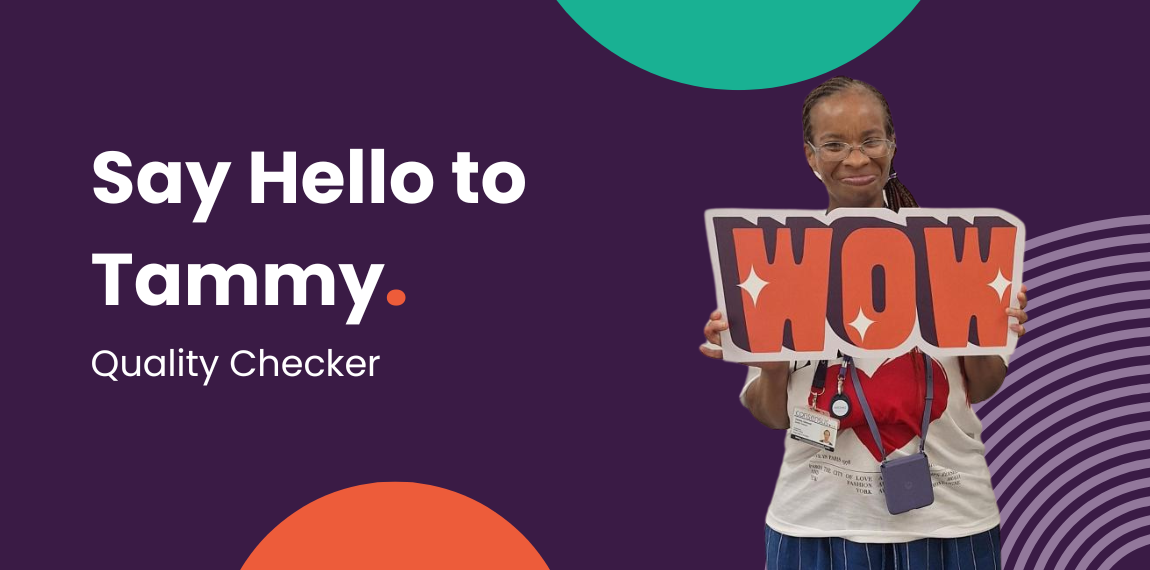Who We Are
Our Commitment

Across Consensus, quality is at the core of everything we do. Maintaining the quality of our services, our colleagues, and the support we deliver; we’re continuously looking for ways to improve and create environments for people to flourish in.
Helping us to deliver an outstanding quality of care and providing key insights to ensure every moment matters at Consensus; our Quality Checkers are invaluable. As Consensus employees, the Quality Checker team are responsible for visiting our services and carrying out audits with the views and voice of the people we support at the forefront. As individuals who live within one of Consensus’ services, they have first hand experience of what an outstanding service and excellent support should look like.
And when Tammy was looking for ways to make a difference in the lives of others, becoming a Quality Checker at Consensus was the perfect opportunity. Officially joining the team in February 2023, Tammy has been acting as a voice for those with learning disabilities ever since and flourishing within herself. Ensuring people’s needs and concerns are addressed, picking up on small interactions which others often miss, and using her knowledge of Makaton & Sign language to interact with others – Tammy’s strength have shone through from her ability to empathise and connect with people.
Learning every step of the way, Tammy has also been supported to complete online training to constantly develop her knowledge in ensuring that each person she interacts with feels valued and cared for. Her humility shines through in her own reflection: ‘I don’t understand why people are moved by me, I must bring something to them… whether it’s that I’m kind, caring, considerate, passionate – I surprise myself!”
Making a difference to everyone around, we caught up with Tammy to find out exactly why she’s so passionate about her role, and what being a Quality Checker means to her.
Why did you apply to become a Quality Checker?
I wanted to help be a voice for people with learning disabilities who might not be able to express themselves. I’d never had a job before so I was a little surprised but confident I could do it. As someone with Prader-Willi Syndrome as well, I wanted to speak up for us and make sure people hear and understand our perspectives, our opinions, and what we need. I wanted to make a change.
What are some of the changes you want to make in the world?
One of the most important parts was the way people talk about people with learning disabilities. A lot of people talk about us, but not to us and that’s a problem. There’s a lot of language people use to discuss us that is not only wrong but discriminatory and I want to change peoples attitudes towards us.
Not a lot of people understand what PWS is or how it can affect you. I was diagnosed with it when I was 28 and I was 30 stone then – it took a lot of learning, work, and a self-acceptance to be able to manage it and it’s much harder when I’m struggling with my mental health. But when people take time to listen and learn about PWS or any condition, they can actually support you and not make judgements.
What’s a normal day at work for you?
It’s varied but I spend a lot of time visiting other services, doing surveys and checking that people are getting the right care and helping the team understand what they can do to support people better using my own knowledge and experience. I can see a lot of things that the support workers or managers can’t because I have a different perspective to them and can pick up on problems they didn’t even realise existed.
I have a PA who works with me and helps me prepare myself for work and we work really well together so I can talk to him if I’m struggling or need help understanding something we’re doing. Sometimes I’m doing audits, sometimes I go to meetings at Central Support, sometimes I’m presenting awards – it changes a lot.
And what’s your favourite part of the job?
I don’t have a favourite part – I love everything. I really enjoy learning and take training courses regularly – I recently took the Oliver McGowan Training and it had a huge impact on me. But I love that I get to visit services and people all over the country and meet so many people and get them to talk to me about things that matter to them. I learned sign language so I can speak to friends who are deaf and also Makaton so people who struggle to communicate can still open up to me and be heard.